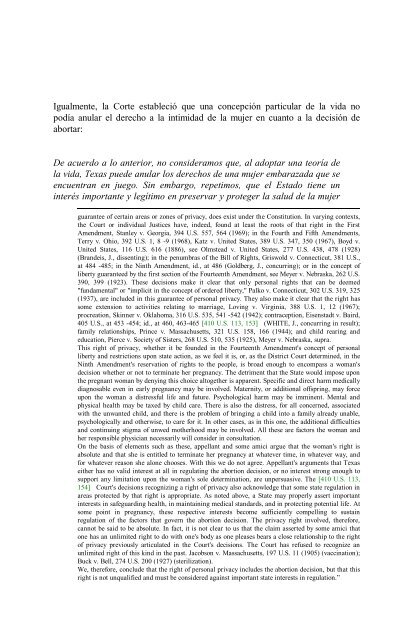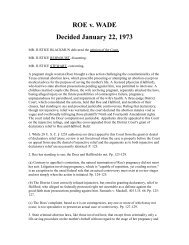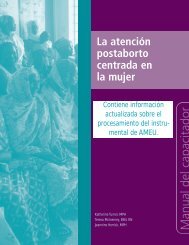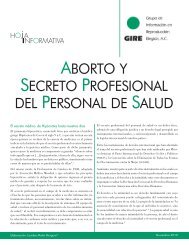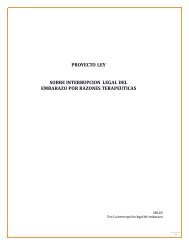- Page 1 and 2:
Sentencia C-355/06 EXCEPCION DE PLE
- Page 3 and 4:
El fundamento de la prohibición de
- Page 5 and 6:
CONVENCION SOBRE ELIMINACION DE TOD
- Page 7 and 8:
con el derecho al libre desarrollo
- Page 9 and 10:
El legislador colombiano decidió a
- Page 11 and 12:
ecurso a la sanción penal para la
- Page 13 and 14:
Respecto de los cargos formulados c
- Page 15 and 16:
(Julio 24) “Por la cual se expide
- Page 17 and 18:
Ahora bien, respecto de las argumen
- Page 19 and 20:
constitucionales y establecer así
- Page 21 and 22:
derechos sacrificados (derecho de l
- Page 23 and 24:
Vida, salud e integridad La vida f
- Page 25 and 26:
El aborto ilegal constituye una vio
- Page 27 and 28:
hace debe someterse a un aborto en
- Page 29 and 30:
Resulta evidente que desde el momen
- Page 31 and 32:
Violación al libre desarrollo de l
- Page 33 and 34:
1. Para prevenir el aborto inducido
- Page 35 and 36:
manifestaciones. Una de ellas, que
- Page 37 and 38:
como máxima expresión del poder e
- Page 39 and 40:
de administrar justicia, tiene la f
- Page 41 and 42:
con lo cual la violación de su hon
- Page 43 and 44:
En escrito recibido en la Secretar
- Page 45 and 46:
de resistir, la penalización del a
- Page 47 and 48:
En consecuencia, la penalización d
- Page 49 and 50:
“Artículo 640. No se incurrirá
- Page 51 and 52:
supuestamente penas menores a las q
- Page 53 and 54:
Para sentar su posición sobre el p
- Page 55 and 56:
forma previa y para efectos demostr
- Page 57 and 58:
En sentencia C-507 de 2004, la Cort
- Page 59 and 60:
Frente a este trato diferente se pu
- Page 61 and 62:
con el segundo paso de la ponderaci
- Page 63 and 64:
7. La penalización absoluta impone
- Page 65 and 66:
se configura como una circunstancia
- Page 67 and 68:
equiere tratamiento y hospitalizaci
- Page 69 and 70:
No obstante los anteriores datos, c
- Page 71 and 72:
Considera igualmente importante el
- Page 73 and 74:
Esto sucede igualmente en el ámbit
- Page 75 and 76:
Estudios han comprobado psicológic
- Page 77 and 78:
G. Exigencia de la democracia y el
- Page 79 and 80:
tan categórica, sobre los mismos f
- Page 81 and 82:
Por las anteriores razones consider
- Page 83 and 84:
ealidad de las mujeres que han sido
- Page 85 and 86:
Las circunstancias a que se hace me
- Page 87 and 88:
trámite tripartida (negociado por
- Page 89 and 90:
eproducir el contenido material del
- Page 91 and 92:
espeto del derecho a la igualdad, l
- Page 93 and 94:
El señor Guillermo Otálora Lozano
- Page 95 and 96:
normas demandadas fundamentada en l
- Page 97 and 98:
6-. Intervención amicus curiae de
- Page 99 and 100:
BETANCUR TIRADO, Arzobispo de Maniz
- Page 101 and 102:
EULALIA GIL DUQUE, GLORIA VALDÉS,
- Page 103 and 104:
No se presentaron intervenciones qu
- Page 105 and 106:
MARULANDA, INÉS CORTÉS, GLORIA G
- Page 107 and 108:
16-. Intervención donde se afirma
- Page 109 and 110:
56-. ADRIANA CARO. 57-. ARCELIA COR
- Page 111 and 112:
3-. Solicitantes: ANA ISABEL LÓPEZ
- Page 113 and 114:
5-. Solicitantes: MATILDE BELLO, AN
- Page 115 and 116:
18-. Intervención amicus curiae de
- Page 117 and 118:
i) JORGE RAFAÉL SCALA, abogado en
- Page 119 and 120:
iológica. Adicionalmente, en el ev
- Page 121 and 122:
entre los jóvenes. Todo lo anterio
- Page 123 and 124:
12-. Intervención de GUIOMAR A. RI
- Page 125 and 126:
desconocimiento ni la vulneración
- Page 127 and 128:
general existente hacia cierto tipo
- Page 129 and 130:
ordenan la protección de la vida h
- Page 131 and 132:
8-. ILVA MYRIAM HOYOS CASTAÑEDA y
- Page 133 and 134:
epercusiones inconmensurables en el
- Page 135 and 136:
Anexa quinientas seis (506) interve
- Page 137 and 138:
fundamentales de la mujer, como el
- Page 139 and 140:
Los señores HELENA ALVIAR GARCÍA,
- Page 141 and 142:
4.12.2. Intervinientes extranjeros.
- Page 143 and 144:
22.- EUGENIO ALEJANDRO REYES, solic
- Page 145 and 146:
2-. El día 06 de marzo de 2006, se
- Page 147 and 148:
24-. El día 06 de marzo de 2006, s
- Page 149 and 150:
46-. El día 06 de marzo de 2006, s
- Page 151 and 152:
68-. El día 06 de marzo de 2006, s
- Page 153 and 154:
90-. El día 06 de marzo de 2006, s
- Page 155 and 156:
Al respecto, la jurisprudencia cons
- Page 157 and 158:
para ponderarla ahora con otros val
- Page 159 and 160:
protección estatal al embrión com
- Page 161 and 162:
6. El bloque de constitucionalidad:
- Page 163 and 164:
justifique el sacrificio total de l
- Page 165 and 166:
artículo 12 de la Convención. El
- Page 167 and 168:
7.1.2 Pacto Internacional de Derech
- Page 169 and 170:
garanticen la dignidad de la vida h
- Page 171 and 172:
y, con tal objeto se compromete a:
- Page 173 and 174:
social, médico y jurídico” 3 pu
- Page 175 and 176:
Circunstancias bajo las cuales 48 s
- Page 177 and 178:
9.3.2. Todos los derechos merecen p
- Page 179 and 180:
embarazos resultados de violaciones
- Page 181 and 182:
Cuando la vida de la mujer esta en
- Page 183 and 184:
Entonces, el juez queda autorizado
- Page 185 and 186:
No contemplan acciones preventivas:
- Page 187 and 188:
mujeres que se han sometido a abort
- Page 189 and 190:
Así mismo, la jurisprudencia de la
- Page 191 and 192:
de Marzo de 2006, formularon recusa
- Page 193 and 194:
presentada por el ciudadano Carlos
- Page 195 and 196:
Irish FAmily Planing Association in
- Page 197 and 198:
proceso por ser laboralmente depend
- Page 199 and 200:
Así entonces, los 10 días hábile
- Page 201 and 202:
2. 3. 6. Todas las nulidades alegad
- Page 203 and 204:
aborto inducido como un grave probl
- Page 205 and 206:
“[P]ara determinar si se esta en
- Page 207 and 208:
sido objeto de un pronunciamiento d
- Page 209 and 210:
el procedimiento de su formación,
- Page 211 and 212:
que las autoridades están institui
- Page 213 and 214:
Por otra parte, si bien corresponde
- Page 215 and 216:
El legislador en tales hipótesis a
- Page 217 and 218:
cuando las demás medidas no result
- Page 219 and 220:
Así pues, la definición citada ha
- Page 221 and 222:
todo coherente y armónico, otro ta
- Page 223 and 224:
Dicha ponderación exige identifica
- Page 225 and 226:
su salvaguarda protegiéndolos de u
- Page 227 and 228:
Internacional de Derechos Económic
- Page 229 and 230:
Otros derechos sexuales y reproduct
- Page 231 and 232:
conquista del mundo civilizado que
- Page 233 and 234:
constitucional. Por lo mismo, al de
- Page 235 and 236:
tratamiento punitivo atendiendo a l
- Page 237 and 238:
posibles, de tal forma que tanto la
- Page 239 and 240:
opción. No se trata de restarle im
- Page 241 and 242:
consecuencia, no es constitucionalm
- Page 243 and 244:
"En Colombia, las políticas perfec
- Page 245 and 246:
En efecto, el derecho a la salud co
- Page 247 and 248:
eproductiva. A continuación se har
- Page 249 and 250:
Así mismo, se afirma que de confor
- Page 251 and 252:
con independencia de la gravedad de
- Page 253 and 254:
constitucionales, dado que un conce
- Page 255 and 256:
establecen en su legislación penal
- Page 257 and 258:
puede realizarse, siempre y cuando
- Page 259 and 260:
derechos de la mujer embarazada, de
- Page 261 and 262:
el universo de medidas posibles aqu
- Page 263 and 264:
embarazo es resultado de una conduc
- Page 265 and 266:
incesto, es preciso que el hecho pu
- Page 267 and 268:
Algunos intervinientes sostienen qu
- Page 269 and 270:
objeción de conciencia, debe proce
- Page 271 and 272:
diseñar autónomamente su propio p
- Page 273 and 274:
el derecho de expresar su opinión
- Page 275 and 276:
Todas las hipótesis señaladas com
- Page 277 and 278:
sentencia, decidir la interrupción
- Page 279 and 280:
MARTHA VICTORIA SÁCHICA DE MONCALE
- Page 281 and 282:
CONVENCION AMERICANA SOBRE DERECHOS
- Page 283 and 284:
En un Estado de derecho, que presup
- Page 285 and 286:
1. En mi calidad de Magistrado Pone
- Page 287 and 288:
En opinión del suscrito Magistrado
- Page 289 and 290:
En consecuencia, la única manera a
- Page 291 and 292:
titulares las personas ordinarias,
- Page 293 and 294:
- Sí, para hacerle una explicació
- Page 295 and 296:
De acuerdo con el derecho internaci
- Page 297 and 298:
“ La expresión "el derecho a la
- Page 299 and 300:
consecuencia, son los Estados los q
- Page 301 and 302:
El Estado promoverá las condicione
- Page 303 and 304:
Por consiguiente, la mujer es sujet
- Page 305 and 306:
la personalidad. Y específicamente
- Page 307 and 308:
más que a otro, porque entonces la
- Page 309 and 310:
libre , si se sanciona o penaliza a
- Page 311 and 312:
tengo necesidad de pensar: otro tom
- Page 313 and 314:
de demostrar que la necesidad de di
- Page 315 and 316:
Así entonces, es con base en su so
- Page 317 and 318:
Se ha señalado que la persona conf
- Page 319 and 320:
que un Estado puede recortar derech
- Page 321 and 322:
de personas deja a otra persona o g
- Page 323 and 324:
limita al legislador, incluido el l
- Page 325 and 326:
equilibrio. vez>.)” 193 Simplemen
- Page 327 and 328:
cuando se le obliga a procrear cont
- Page 329 and 330:
Así las cosas, resulta evidente pa
- Page 331 and 332: o alteraciones de la coagulación (
- Page 333 and 334: gangliósidos (un tipo de sustancia
- Page 335 and 336: Así las cosas, el embarazo de una
- Page 337 and 338: 3. DE LA RESPONSABILIDAD AL ABORTAR
- Page 339 and 340: Permitir que todas las mujeres a la
- Page 341 and 342: No corresponde al suscrito Magistra
- Page 343 and 344: ART. 123.—Aborto sin consentimien
- Page 345 and 346: asarse en la represión, la cual es
- Page 347 and 348: Estas circunstancias de atenuación
- Page 349 and 350: 1. Mediante escrito presentado el t
- Page 351 and 352: En materia de control abstracto de
- Page 353 and 354: “En primer lugar, procede la inte
- Page 355 and 356: Presidente de la Conferencia Episco
- Page 357 and 358: General de la Nación , el día 27
- Page 359 and 360: el contrario siempre consistieron e
- Page 361 and 362: ejercicio del control automático d
- Page 363 and 364: contra las normas acusadas, siempre
- Page 365 and 366: 0ART. 123.—Aborto sin consentimie
- Page 367 and 368: En primer lugar, el suscrito Magist
- Page 369 and 370: ACLARACIÓN DE VOTO DEL MAGISTRADO
- Page 371 and 372: CORTE EUROPEA DE DERECHOS HUMANOS-P
- Page 373 and 374: que el legislador opte por regular
- Page 375 and 376: han considerado suficientemente só
- Page 377 and 378: afectación del derecho a la vida o
- Page 379 and 380: de cada régimen constitucional as
- Page 381: obtener un aborto antes de que el f
- Page 385 and 386: En resumen, la Corte estableció qu
- Page 387 and 388: Desde 1973 hasta 1992 la Corte Supr
- Page 389 and 390: que la mujer ejerza su derecho a ab
- Page 391 and 392: La decisión esencial de la sentenc
- Page 393 and 394: En resumen, en la sentencia Planned
- Page 395 and 396: Tribunal para modificar el remedio
- Page 397 and 398: La primera decisión fue en 1975 y
- Page 399 and 400: - Además, el aborto practicado por
- Page 401 and 402: significan frecuentemente un cambio
- Page 403 and 404: “En todos los demás casos, el ab
- Page 405 and 406: es indicado por el médico en consi
- Page 407 and 408: El Tribunal declaró la inconstituc
- Page 409 and 410: 4. Por principio, el aborto en cual
- Page 411 and 412: El Tribunal, con este segundo fallo
- Page 413 and 414: terminación de su embarazo lícita
- Page 415 and 416: madre y la salvaguardia del embrió
- Page 417 and 418: tanto, la licitud del aborto debe e
- Page 419 and 420: Igualmente, la asistencia y la pres
- Page 421 and 422: 4. Portugal El Tribunal Constitucio
- Page 423 and 424: consentimiento de su representante
- Page 425 and 426: La vida intrauterina es un bien con
- Page 427 and 428: ya que el ordenamiento portugués n
- Page 429 and 430: convalidó el concepto de “situac
- Page 431 and 432: efieren a que en el caso del aborto
- Page 433 and 434:
Sobre las circunstancias específic
- Page 435 and 436:
producto de una violación; y iii)
- Page 437 and 438:
El texto original dice: “251. (1)
- Page 439 and 440:
Los requisitos que fueron especialm
- Page 441 and 442:
aún si la sección 251 fuese refor
- Page 443 and 444:
egulación, pero sí estableció qu
- Page 445 and 446:
esa protección por lo que se encue
- Page 447 and 448:
Attorney General contra X- admite u
- Page 449 and 450:
atacada por inconstitucional por no
- Page 451 and 452:
difícil” o “una situación per
- Page 453 and 454:
vivió. La demandante sufrió una d
- Page 455 and 456:
En el sistema europeo, la Corte Eur
- Page 457 and 458:
En cuanto a los pronunciamientos de
- Page 459 and 460:
10.1 Organismos no jurisdiccionales
- Page 461 and 462:
El Comité se ha pronunciado en var
- Page 463 and 464:
El Comité también ha criticado en
- Page 465 and 466:
de la Convención de los Derechos d
- Page 467 and 468:
de subsidios no discrimine a aquell
- Page 469 and 470:
excepciones en su penalización com
- Page 471 and 472:
y solo puede realizarse cuando “l
- Page 473 and 474:
embarazo pone en grave peligro la s
- Page 475 and 476:
esponsabilidad, o si se excede el t
- Page 477 and 478:
En Polonia la indicación de aborto
- Page 479 and 480:
En India la indicación de aborto l
- Page 481 and 482:
Los abortos deben ser realizados en
- Page 483 and 484:
caso de que la mujer se encuentre e
- Page 485 and 486:
posibilidad de que el menor a nacer
- Page 487 and 488:
En Polonia también se contempla la
- Page 489 and 490:
(incurable, severo, irremediable, e
- Page 491 and 492:
mujer, el cual incluye un peligro p
- Page 493 and 494:
espera mínimo de seis días despu
- Page 495 and 496:
Hungría comparte la limitación te
- Page 497 and 498:
severo o una situación social impo
- Page 499 and 500:
ANEXO CUADRO I ORIENTACIÓN BÁSICA
- Page 501 and 502:
País Orientación básica de la No
- Page 503 and 504:
CUADRO II PARAMETROS SENTADOS POR L
- Page 505 and 506:
País Orientación básica de la Co
- Page 507 and 508:
País Orientación básica de la Co
- Page 509 and 510:
País Orientación básica de la Co
- Page 511 and 512:
País Orientación básica de la Co
- Page 513 and 514:
CUADRO III. SISTEMAS LEGISLATIVOS C
- Page 515 and 516:
CUADRO IV SISTEMAS LEGISLATIVOS CON
- Page 517 and 518:
Irlanda Polonia Portugal Vida de la
- Page 519 and 520:
CUADRO V SISTEMAS LEGISLATIVOS CON
- Page 521 and 522:
Irlanda Polonia Portugal Vida de la
- Page 523 and 524:
de fundamento probatorio a la provi
- Page 525 and 526:
Para establecer si una resolución
- Page 527 and 528:
CONFLICTO DE DERECHOS-Criterios par
- Page 529 and 530:
indefensión, supone una relativiza
- Page 531 and 532:
ABORTO-Penalización no desconoce d
- Page 533 and 534:
decidendi) de sus precedentes decis
- Page 535 and 536:
de poderes 1 , en punto a la determ
- Page 537 and 538:
-Ya están aquí los escrutadores,
- Page 539 and 540:
1.5 De otro lado, los suscritos hac
- Page 541 and 542:
agitar”, regla que en buen romanc
- Page 543 and 544:
nasciturus, de la integridad famili
- Page 545 and 546:
(artículo 2, 13 de la C.P.), la pr
- Page 547 and 548:
Como se dijo, el fallo del cual dis
- Page 549 and 550:
i. El material genético de los cro
- Page 551 and 552:
o. Finalmente, aproximadamente al s
- Page 553 and 554:
iológicamente justificada. Si el E
- Page 555 and 556:
2.1.3 De otro lado, como arriba se
- Page 557 and 558:
En el mismo orden de ideas, el Pre
- Page 559 and 560:
no se puede afirmar lo mismo en lo
- Page 561 and 562:
econocimiento de su aptitud para se
- Page 563 and 564:
“Toda persona tiene derecho a que
- Page 565 and 566:
constitucionalidad lato sensu está
- Page 567 and 568:
ecomendación emanada de un organis
- Page 569 and 570:
a. Las recomendaciones a Colombia d
- Page 571 and 572:
c. Recomendaciones a Colombia del C
- Page 573 and 574:
De lo anterior concluyen los suscri
- Page 575 and 576:
Por último los suscritos observan
- Page 577 and 578:
mujeres han venido ocupando en el D
- Page 579 and 580:
Para los suscritos, la afirmación
- Page 581 and 582:
4.2.3 Criterios para resolver los c
- Page 583 and 584:
más de por las reglas, por los pri
- Page 585 and 586:
La Constitución no prohíbe la res
- Page 587 and 588:
Para explicar de mejor manera lo an
- Page 589 and 590:
agente. (iv) que no existan medios
- Page 591 and 592:
contrario, no queda más que padece
- Page 593 and 594:
tampoco su estatus de persona human
- Page 595 and 596:
La Corte en la Sentencia C-239 de 1
- Page 597 and 598:
exigencia, entre ellos en primer lu
- Page 599 and 600:
elegir autónomamente para sí el m
- Page 601 and 602:
muerto; la circunstancia de la mate
- Page 603 and 604:
Desde un criterio que atiende a la
- Page 605 and 606:
legislativa en materia penal no es
- Page 607 and 608:
es la garantía del derecho a la vi
- Page 609 and 610:
practicado por un tercero sobre una
- Page 611 and 612:
RECOMENDACIONES DE ORGANISMOS INTER
- Page 613 and 614:
Luego de haber aclarado el carácte
- Page 615 and 616:
suscintamente las manifestaciones q
- Page 617 and 618:
) El artículo 93, según el cual
- Page 619 and 620:
Internacionales de Derechos Humanos
- Page 621 and 622:
incorporados no solo a la legislaci
- Page 623 and 624:
Derechos Humanos, a quien compete l
- Page 625 and 626:
espaldo que le transmite el princip
- Page 627 and 628:
mujeres; (iii) a pesar de ello, par
- Page 629 and 630:
la resolución 23/81, referida al c
- Page 631 and 632:
ealidad, la conferencia enfrentó e
- Page 633 and 634:
artículo 4º del Pacto de San Jos
- Page 635 and 636:
“La permisibilidad que ha ocasion
- Page 637 and 638:
mujer, considerada integralmente co


